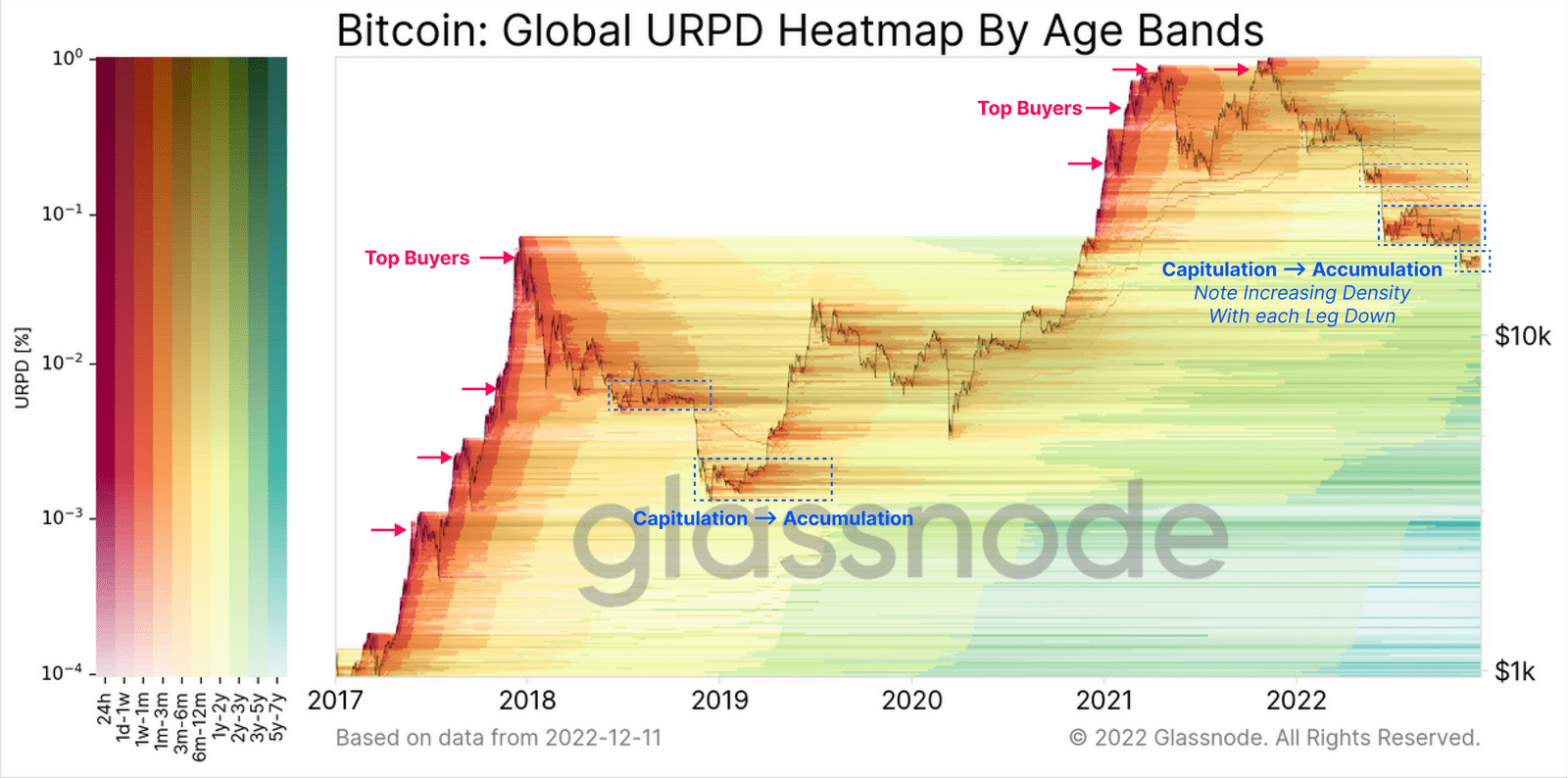State of Bitcoin in 2022: From HODler Confidence to Mining Transformation

2022 has been a brutal year for the crypto investors market by the harsh crypto winter. It all started with the collapse of the TerraUSD algorithmic stablecoin, which prompted other major crypto players to fall like dominos: Three Arrows Capital. Voyager Digital, Celsius Network, FTX, BlockFi.
Not one project, protocol, or institution exists that hasn’t felt the sting of contagion this year. Bitcoin futures volumes are hovering near multi-year lows owing to the tightening liquidity, widespread deleveraging, and the impairment of several lending and trading desks in the sector. Open Interest, too, took a similar turn following the catastrophic fall of FTX. Bitcoin miners also bled heavily.
Despite spectacularly large losses, the accumulation trend stays strong in this bear market.
HODlers Remain Unfazed
Bitcoin is currently locked in the narrow range of $16,000 to $18,000 as the market continues to suffer from lingering macroeconomic uncertainty. That hasn’t stopped investors from piling up the tokens.
According to Glassnode’s last edition of the year, the density of coin re-accumulation has increased after each market leg down. One that stood out, in particular, is the period between June to October when between $18k and $24k coins were acquired. The report stated,
“2022 was a brutal year, and it has driven volatility and volumes to multi-year lows, as liquidity and speculation dry up. With speculators gone, Bitcoin Long-term Holder supply has pushed to yet another ATH, and investors appear to be stepping in with increasing coin volume on each price leg down.”

While institutions are being cautious, it’s the retail investors who are accumulating more and more Bitcoin. In fact, recent data suggest that nearly 17% of Bitcoin’s total circulating supply is now held by retail investors. According to Glassnode, such holders are those with less than 10 BTC in a wallet (currently worth $169K at today’s prices.) The percentage of Bitcoin supply held by retail investors has been on an upward trajectory since 2011.
Mining Revenue Slump
Bitcoin mining has undergone a dramatic transformation this year after being hit by significant income stress. A large portion of Bitcoin’s active hash rate was switched off, which triggered the difficulty adjustment to fall by 7.32% most recently.
Over the past couple of months, many operators have taken their ASIC rigs offline while several other miners slid to bankruptcy or are on the verge of one. Compute North was the first in line to file for bankruptcy back in September.
Three months later, another prominent Bitcoin miner – Core Scientific – filed for Chapter 11 bankruptcy protection in Texas. Greenidge also approached the NYDIG to prepare for restructuring the financial debt of $74 million, though bankruptcy is still on the cards.






 Bitcoin
Bitcoin  Ethereum
Ethereum  Tether
Tether  USDC
USDC  Dogecoin
Dogecoin  Cardano
Cardano  TRON
TRON  Chainlink
Chainlink  Stellar
Stellar  LEO Token
LEO Token  Hedera
Hedera  Bitcoin Cash
Bitcoin Cash  Litecoin
Litecoin  Monero
Monero  Dai
Dai  OKB
OKB  Gate
Gate  Ethereum Classic
Ethereum Classic  Cronos
Cronos  VeChain
VeChain  Algorand
Algorand  Cosmos Hub
Cosmos Hub  KuCoin
KuCoin  Maker
Maker  Stacks
Stacks  Tether Gold
Tether Gold  IOTA
IOTA  Theta Network
Theta Network  Tezos
Tezos  Zcash
Zcash  TrueUSD
TrueUSD  NEO
NEO  Polygon
Polygon  Dash
Dash  Zilliqa
Zilliqa  Synthetix Network
Synthetix Network  0x Protocol
0x Protocol  Decred
Decred  Qtum
Qtum  Basic Attention
Basic Attention  Siacoin
Siacoin  Holo
Holo  Ravencoin
Ravencoin  NEM
NEM  DigiByte
DigiByte  Enjin Coin
Enjin Coin  Ontology
Ontology  Nano
Nano  Hive
Hive  Waves
Waves  Lisk
Lisk  Status
Status  Steem
Steem  Numeraire
Numeraire  Pax Dollar
Pax Dollar  BUSD
BUSD  Huobi
Huobi  OMG Network
OMG Network  Bitcoin Gold
Bitcoin Gold  Ren
Ren  Augur
Augur  Bitcoin Diamond
Bitcoin Diamond  HUSD
HUSD  Bytom
Bytom